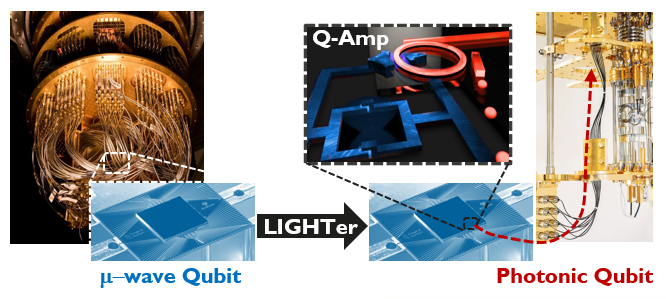Electro-optical technologies for advanced control of quantum systems and quantum computers
Leuven | More than two weeks ago
An application-oriented research exploration on how electrically controlled optics might help to enable the emerging quantum technologies.
Introduction
Quantum technologies are emerging as a promising field of research and innovation, with potential applications in various domains such as computation, communication, sensing, and metrology. However, there are still many challenges and limitations that hinder the scalability and performance of quantum systems and quantum computers. One of these challenges is the efficient and reliable control and manipulation of quantum states using electrically driven optical devices, such as transducers, modulators, switches, and couplers. These electro-optical devices are essential for interfacing different quantum platforms, such as superconducting qubits, trapped ions, and photonic qubits, as well as for implementing quantum operations, such as readout, entanglement, and routing. Therefore, developing novel electro-optical technologies that are compatible with the requirements of quantum systems and quantum computers is a key research goal.
Project description
This PhD project is part of the ERC starting grant Qamp and aims to explore and evaluate new electro-optical materials and devices that can enable the advanced control of quantum systems and quantum computers. The project will focus on the following aspects:
-Investigating the properties and performance of novel electro-optical materials, such as ferroelectrics, piezoelectrics, and electro-optic polymers, and how to integrate them into optical devices that can operate at cryogenic temperatures.
-Designing and fabricating electro-optical devices, such as transducers, modulators, switches, and couplers, that can meet the specifications and demands of different quantum platforms, such as superconducting qubits, trapped ions, and photonic qubits.
-Testing and characterizing the electro-optical devices in terms of efficiency, bandwidth, noise, stability, and compatibility with quantum systems and quantum computers.
-Exploring the potential applications and benefits of the electro-optical devices for enabling various quantum technologies, such as quantum computation, communication, sensing, and metrology.
Requirements and benefits
The ideal candidate for this PhD project should have a master's degree in physics, electrical engineering, or nanotechnology, and have a strong interest and motivation in quantum technologies and electro-optics. Experience in photonics and/or superconducting circuits/qubits, as well as in nanotechnology fabrication, is an asset. The candidate will have the opportunity to conduct academic research within IMEC, an organization that has a strong drive to enable fundamental research to solve society's challenges. The candidate will also benefit from the access to state-of-the-art facilities, equipment, and expertise, as well as from the collaboration and interaction with other researchers and partners in the field.

Required background: Electrical engineering, Physics, Quantum engineering
Type of work: 60% Experiments (Technology & Measurments), 20% Theory, 20% Modeling
Supervisor: Kristiaan De Greve
Daily advisor: Christian Haffner
The reference code for this position is 2024-146. Mention this reference code on your application form.
